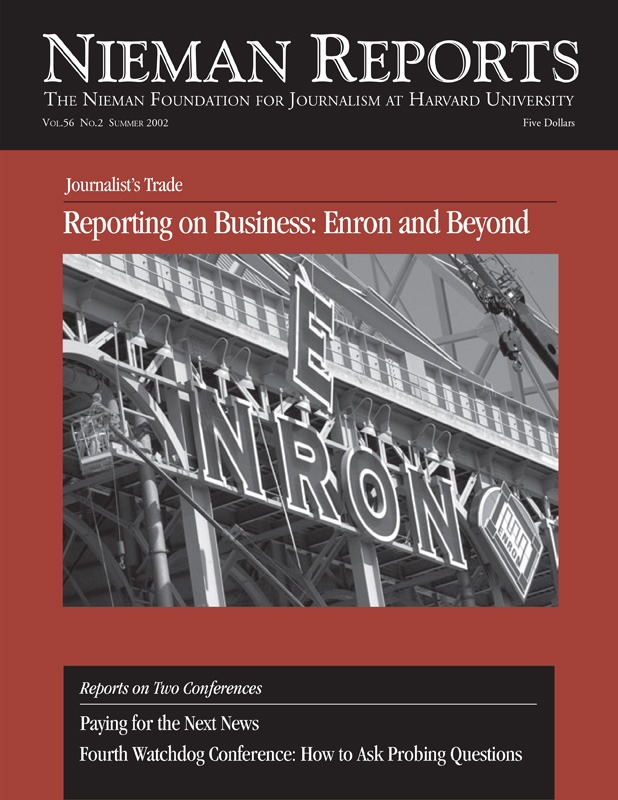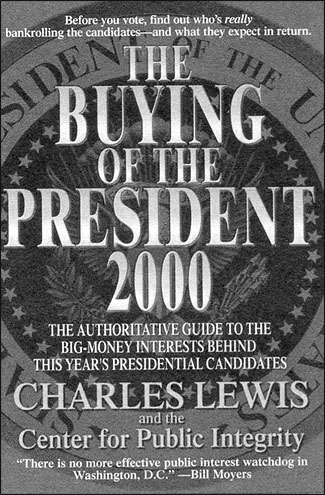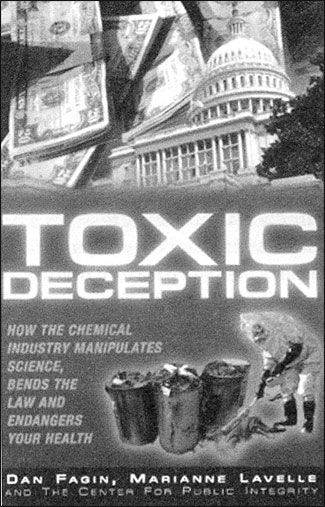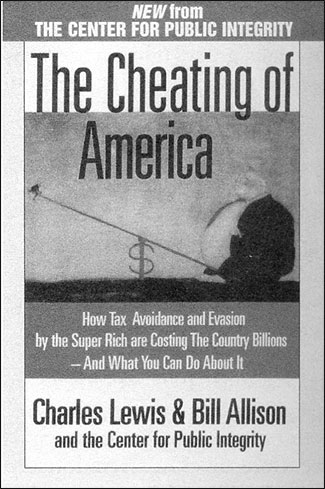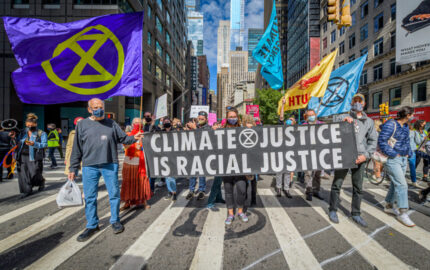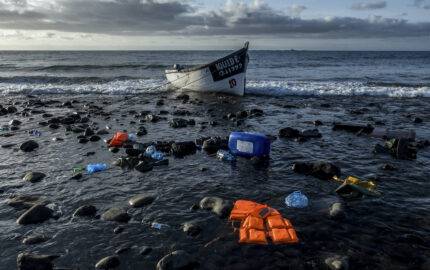Charles Lewis is the founder and executive director of the Center for Public Integrity, a nonprofit, nonpartisan research organization that investigates issues related to public service and ethics. It operates with an annual budget of $3.5 million, with 30 full-time employees. During the past 12 years, the center has released over 100 reports, including nine commercially published books, and its findings have led to coverage of stories about issues that are often neglected in the mainstream press. More information about the center can be found at www.publicintegrity.org.
What follows is an edited version of the remarks Lewis made at the Watchdog conference in which he focused on the work of the center and the value of asking (and answering) questions that daily reporters might not have the luxury of pursuing.
Bob Giles: In 1989 Chuck Lewis, the story goes, thought about his professional life and he recognized these qualities: prestige, accomplishment and frustration, all consequences of 11 years in television journalism, including a stint as producer for “60 Minutes.” The frustration was influenced by a belief that investigative reporting did not have a high value in journalism; that the news media was turning a blind eye to some serious problems in our society.
It was in this state of mind that Chuck left the security of “60 Minutes” in search of a world where he could take several months or a year to investigate an issue. This kind of journalism could not be done within another news organization, he concluded, or within a profit-making entity. He needed to start his own nonprofit and raise the money. The organization was called the Center for Public Integrity, and in early 1990 it amounted to this: a two year lease on a small office on K Street in Washington, which he had secured by using his house as collateral. No furniture for the office, $2,000 in a checking account, and one employee.
By the end of that year, the center had released a study on foreign lobbying by White House trade officials. It was the first of more than 100 reports, books and newsletters that were published over the next decade. What distinguished each report was the nature of hard digging in places that the mainstream press rarely looked.
The Center for Public Integrity’s reach is now global. It has produced groundbreaking investigative reporting that has utilized the work of more than 80 journalists from 39 countries. This year Chuck Lewis and his colleagues have produced a book called “The Cheating of America,” which exhaustively documents how wealthy and well connected citizens and corporations get out of paying taxes.
An endorsement of the center’s contribution to the public interest comes from no less an authority than historian Arthur Schlesinger, Jr., who says, “The center not only has given new force to investigative reporting in the United States, but it has trained and sustained investigators in parts of the world where investigation is really a dangerous trade.”
Charles Lewis: It’s incredibly daunting to talk to Nieman Fellows and Pulitzer Prize-winners about asking questions as journalists. It’s sort of like talking to Babe Ruth about baseball, so I approach this with a sober degree of humility and with a grain of salt is the way you ought to take it.
If there is a central message to leave from my vantage point, it’s not what question we ask. It’s the fact that we ask at all. That is the most important issue. I know that sounds ridiculously basic, but so often I’ve seen hundreds of stories that are incredibly important, and they are never attempted. The questions that we keep talking about in this majestic way with a capital “Q” never get asked at all. It’s not what question; it’s that we ask in the first place. One of our favorite quotes at the center is from Harry Truman, who said, “I don’t give people hell, we just tell the truth and they think it’s hell.”
As I tell stories about what we do, understand that I recognize the limitations of daily spot news journalism and commercial television or commercial journalism. We don’t have to worry about ratings, which is a good thing, for us at least. There are not really any space or time limitation issues, or hardly any at all. And we don’t have to worry about having access to important, powerful people going on camera every night that is, for TV, a huge problem. You’re not going to ask terrifically difficult questions, or if you do, you get one shot at it, and you won’t see that guest anymore. You may even be shut out from an agency for weeks or months at a time. We don’t have those limitations. So when I lay out some of the questions in the context of this conference, the questions that we asked or the projects that we undertook, understand that we did not have those limits on our conduct, or whatever, our approach.
‘America’s Frontline Trade Officials’
In our very first study, we noticed that when a lot of White House trade officials left government, they went to work for foreign governments and foreign corporations. During the late 1980’s that was a big deal in the United States. There were hundreds of thousands of jobs being lost, with a massive trade deficit with Japan and other countries, so this was the kind of thing that might resonate.
What we do at the Center for Public Integrity is the kind of research that generally no one would ever remotely want to attempt if they’re sane. So we interviewed 75 men and women who had been White House trade officials over a 15-year period, Republicans and Democrats. We had a very elaborate methodology about what constitutes a senior White House trade official, a certain level, and all of that kind of thing.
We wrote up a 90,000-word report called “America’s Frontline Trade Officials.” We found that 47 percent of White House trade officials, when they leave government, do, in fact, go to work for foreign governments and foreign corporations. What we found was then covered by the media. We do news conferences at the National Press Club and ABC’s “20/20,” CSpan and CNN, and The Associated Press, National Public Radio, and all kinds of folks covered the release of our findings.
We had found, among other things, that there were White House trade officials, after they left government, who were advisors to the White House and to other departments, who had security clearances. We had one fellow working for the government of Iraq as a foreign agent who simultaneously had a security clearance. Carla Hills, the U.S. trade representative under George Bush, the father, thought that that was a non-issue. Weeks after our report came out, the Justice Department told her it was in fact illegal under certain statutes. She had to get rid of all of those people.
But, again, this is a thing where everyone sort of knew this was going on in Washington, but no one did it. It was just a simple matter of tracking numbers and doing the research and, again, asking the question, “Is it true all of these people are doing all of these things?” Just by looking, we found that, yes, indeed it is.
‘Saving for a Rainy Day’
There had been news coverage in Washington about members of Congress taking leftover campaign money with them when they go. A law was passed that they couldn’t do it, and at that point the media stopped covering the story. But in Washington there are millions of records that are public records that no one reads. We thought it would be—I admit this was somewhat mischievous—but we wanted to see how they were spending their leftover campaign money. The ones who got in before they changed the law, who served between ’79 and ’93, could still spend their money.
So we did a report called “Saving for a Rainy Day,” and we found that 110 former members of Congress took 10 million dollars in leftover campaign money and basically put it in their pockets. Some of them bought Mercedes and Lincoln Continentals and Cadillacs. Some of them paid their legal bills from their ethics problems, which was fitting, I thought. But my personal favorite was one fellow actually started a museum about himself with the money. No one wanted to go through hundreds of records. We wanted to know who was doing it, we wanted to find out who they were, we wanted to lay it out, and we did. Once we did it, the media loved it, of course, because it was right there, and it was accessible.
‘Private Parties’
I noticed that the most important lobbyists in Washington had another position. They happened to be the chairmen—in these cases they’re all men—the chairmen of their political parties. Both political parties say you cannot have another job; that this is a full-time job. We found over a 20-year period that half the political party chairmen had all been lobbyists working for firms, making six figure sums, representing clients before government, which is pretty outrageous, if you think about it.
The one that was most remarkable at the time was Ron Brown back in 1992 when he was Democratic Party chairman. He had three other jobs simultaneously. He had a corner office at a lobbying firm called Patton Boggs. He was doing business with the District of Columbia, trying to get contracts for municipal bond work, which we found in public records that showed that he would offer, as his criteria for his credentials, that he was chairman of the Democratic Party. He would be in meetings discussing the counts, legislator counts on this vote and that vote—“We have 35 votes. We need more votes.” He would take all of that information, go back to his lobbying firm, and then the lobbyists would use that inside knowledge, because he would be invited every Wednesday morning to the speaker’s meeting, and they would find out all the internal vote counts. So as a lobbyist he had more information than any other lobbyist did.
Brown did not want to talk to us, you might imagine, but every other former party chairman did. After that thing hit, Bob Woodward did a story for The Washington Post that the FBI questioned Brown about for five hours using our report.
But, again, this is something where people kind of understood that kind of thing goes on, but no one wrote about it. And it was a simple matter of asking the questions, “Can they do this?” “Why do they do it?” “Who does it?” Asking those questions.
‘Under the Influence’
It is always interesting to me, to put it bluntly, who it is that sucks up to presidential candidates whenever an election gets close. Do you ever notice they get suddenly more friends than they used to have? I wanted to see what unpaid policy advisors to presidential candidates did during their day jobs. That’s a really interesting subject because you can imagine, like locusts, the lobbyists descend on all these candidates.
So we did a thing called “Under the Influence” where we tracked all the advisors of presidential candidates, and we found in the process back in—this is 1992—we found that the deputy chairman of the Bush reelection campaign was working for BCCI, the Bank of Credit and Commerce International, arguably the most corrupt bank in the world. It was sanctioned in 26 countries. He was getting more than a million dollars as their lobbyist in Washington and the company was under seven federal criminal grand jury investigations while he was deputy chairman of the Bush campaign.
We pointed out that this might be a conflict of interest. The Bush campaign said that that was ridiculous.
Four years later we did it again, “Under the Influence,” and we found that the co-chairman of the Buchanan campaign in 1996 was a fellow named Larry Pratt, and he had been teaching hate groups how to develop militia capabilities. So groups like Aryan Nation and other white supremacists, he was talking to them and teaching them. We asked the basic question, “Why is someone who is a co-chairman of a presidential campaign that ended up winning New Hampshire and came within three points of beating Dole in Iowa, someone that high up, with the potential for obtaining power? What is that person doing with this kind of background?” Pratt was fired within one hour of our news conference. CNN covered the whole thing live.
‘Well-Healed’
We looked at health care. Now everyone was tracking Clinton, and the dynamics, and this president has a health care plan. We wanted to look at it in a different way. First of all, we had no idea what the best health care policy was, would be, is. I still don’t know, and don’t ask me. But we did think it would be interesting to know who was trying to influence health care.
So being the masochists that we are, we had 17 researchers, and we looked at 660 groups that were trying to influence health care. We looked at the $30 million spent on campaign contributions in a two-year period, the 80 former U.S. officials who went to work for health care companies, and the 181 privately funded trips to “educate” members of Congress about health care. I noticed that they teach them about health care in places like the Bahamas and Hawaii in January.
Forty members on five key committees dealing with health care all had stock in health care. Some were buying and selling and calling their brokers during the markups. We thought this was information the public ought to have, and we wrote it up in this large, 200-page report, half of which were appendices with names and numbers. It’s still the only report that was written in the ’90’s about lobbying on health care. It was used by all three networks and major papers.
‘The Buying of the President’
I have a very strong bias about the political reporting and the level of political reporting in this country. Let’s be really blunt: It’s really bad. In 2000, the amount of political coverage in this country was half of what it was in 1996. In 1996, it was half of what it was in 1992 in sheer word counts, sheer verbiage, sheer coverage. I’ve always had a problem with the superficial nature, and the stenographer nature, of political coverage and the horse race which everyone always complains about, rightly so.
What I was interested in was to do something different. I’ve always also been frustrated and irritated about politicians who never want to be honest about the role money plays in their careers. Every politician you ever talk to says that money doesn’t matter to them. They don’t know who gives them money. Talk to my finance chairman, or talk to my assistant, whatever. They just can’t remember their names and are not available for an interview if you talk to them about it.
So, in 1996, we had 100 students at two universities and 16 researchers and writers, and we worked for 18 months. We went through 20 years or more of campaign finance records. We did a thing, taking a page from David Letterman’s top 10 list. We identified the top 10 career patrons—the people who are their best friends who, frankly, brought you these politicians. These are the people who were with the politician usually from day one, and they have given the most money and sponsored their existence as politicians. These are not things you’ll see in political ads, generally.
“The Buying of the President” came out as a book in January of ’96, and “Frontline” did “So You Want to Buy a President” based on it. The New York Times, Washington Post and A.P. moved the top 10 career patron list all over the country, just because no one knew who the top 10 were. Of course, it was revealing. We found that Bob Dole, the Republican nominee—we knew that being from the Midwest he was close to Archer Daniels Midland, and we imagined, in fact, that they would probably be the first, the top career patron. It’s true that Archer Daniels Midland gave $200,000 in campaign contributions over his career and took him on 35 trips on their corporate jet. The CEO of the company sold a condominium in Florida, an ocean-front condo, to the Doles for $100,000 below the market price. The first mortgage payment wasn’t until eight months after the purchase, which most Americans don’t get to do. All of that makes you sick. By the way, they get billions of dollars in ethanol subsidies, which Dole led the way on.
That is enough for me right there. The Senate Ethics Committee never once investigated them, and no reporter on the Hill has ever done a whole lot about this subject, with one or two minor exceptions.
But, in fact, the number one donor to Dole in his long 44-year public career was the Gallo wine family in Modesto, California. We couldn’t understand—Dole could try to explain away Archer Daniels Midland because he’s from Kansas. So this is agri-business, this is my constituent. But how do you explain Gallo? There are no grapes in Kansas. This is not a logical thing.
So we looked closely, and we found that he had taken $400,000 over his career from this Ernest and Julio [Gallo] company, and we found that they wanted a number of things. They wanted a special inheritance tax, which was known in the Senate as “The Gallo Amendment,” so that they could pass their assets onto their grandchildren without taxes, basically, or vastly reduced taxes. Dole helped them get that. It saved them millions of dollars. That’s one of many things that Dole did for them.
In 2000, we did “The Buying of the President” again. It’s remarkable to me that there is no one else in the United Sates writing investigative profiles like this of the candidates. I mean, I can’t believe it, frankly. We found the top patron for George W. Bush was Enron, and I think of his top 25 career patrons, 14 are oil and energy related; that maybe isn’t surprising, but it is interesting. Enron has had all kinds of favors. They gave $550,000 to Bush before he ran for President. He’s only been a politician since 1994, so you think about that a minute. That’s a lot of money in a short amount of time. There are no limits in Texas, so that explains that.
But Al “Earth in the Balance” Gore, his closest relationship in the world politically is with Occidental Petroleum. We found that he had helped to get soft money to the party and contributions to himself for half a million dollars, and his family had known Armand Hammer, the head of Occidental, for 20 years. Al and Tipper had been on the Occidental corporate jet and, by the way, they gave attractive land in California in a bidding process to Occidental. And Occidental tripled, as part of reinventing government, their oil reserves in one deal, which was announced by Al Gore. But there was no quid pro quo, of course. I’m sorry, I’m getting carried away there. It did seem a little suspicious.
‘Fat Cat Hotel’
Sometimes we, as journalists, just hear stuff, and we then ask logical questions. I had breakfast one time with a fairly well-known state legislator who had been at a party at the Clinton White House the night before, a holiday party. This is back in December 1995. They had seen the Oliver Stone Nixon movie with the President in the movie theater part of the White House and, as they were leaving dinner and going into the movie, they noticed one of the guests was not coming with them. They said to this guy who happens to live in the area, “Hey, where are you going? Aren’t you coming to the movie?” The state legislator said this guy was with a “bimbette” who was 30 years younger than him, and he said, “No, I’m going to the Lincoln Bedroom.” Wink. Wink.
He tells me this, and my natural question was who else is sleeping in the Lincoln Bedroom? What’s going on here? What’s going on? So we’re the ones basically who broke the Lincoln Bedroom scandal. We don’t do sex scandals or windows. This is pre-Monica. But it was interesting and relevant to know.
We did a newsletter called “Fat Cat Hotel,” and we listed 75 men and women. There are two sets of records, both of which are not public: usher records from the upstairs bedrooms and the White House Secret Service entry logs of who gets into the White House. Someone slipped us one year of the usher records, and we then just matched those names with the Federal Election Commission and, of course, lo and behold, we see all of these things.
We have a rule at the center: We never write about anyone unless we talk to them, or at least attempt to talk to them. But, of course, the White House denied it. They said it was ridiculous. They said this is an urban myth, sort of like alligators in the New York sewer. Six months later they issued a list of 938 people who had slept over, more than three times that of any former President. There were notes in the margin where Clinton said “What a great idea. When can we start?” So Clinton was directly, personally involved. So they just lied, basically, through their teeth; which we all know is not uncommon for politicians.
‘The Buying of the Congress’
Most Americans don’t really care about Congress, let’s be honest, or government, not that much, or at least they haven’t historically. The question is if you’re going to look at Congress, you’ve got to do it in a different way. These are our employees. These are people who work for the American people. So we looked systematically at 10 years of legislative records, voting records, campaign finance records, and things that every American cares about, like the cost of food, cable TV rates that they pay every month, food safety, airline safety.
We looked at all the politics about what affects our lives in some way and then we looked to see what our employees have been doing. Of course, time and again, Congress did what you would not, logically, with Gallup Poll results, expect them to do. A lot of the prices of groceries, like the price of milk, were raised because of special deals, and we showed all of that. We showed the cable TV rates after 15 million dollars from the cable industry went up, not down, after the Telecommunications Act passed in 1996.
Nine thousand people die every year from food poisoning, millions more get sick. We found that not one bill went to the floor of the House or Senate over 10 years to deal with food safety and health inspections at meat packing plants—not coincidental here.
The problem is that our book about this came out the same day as the Ken Starr report on Monica Lewinsky. I hate when that happens, but it was a useful way to look at Congress, and I’d like to go back and try again when there is not a sex scandal.
‘50 States Project’
We care even less in this country about state legislatures. But, in fact, things like health insurance are regulated at the state level. A lot of power and a lot of money have moved to the states. We contacted every state legislator in America, 7,000 people, by letter and by phone, and we looked at the conflicts of interest. Forty-one of the 50 state legislatures are part time, so the doctors are on the health care committee, the lawyers are on the judiciary committee, and you can imagine there are policies that are contoured directly to their own interests. One in five state legislators serves on a committee that could benefit them personally. We put all of this on the Internet and showed it all and won the Investigative Reporting and Editors (IRE) online journalism award last year for that.
‘Toxic Deception’
We wanted to see how chemical companies keep dangerous products on the market. I went to the 25 leading scientists at the Center for Disease Control, EPA [Environmental Protection Agency], and Sloan-Kettering, and all of these places, and said, “If you were giving an Oscar award for the most dangerous chemical in America, what would it be?” I took out tobacco and dioxin because they have been written about so extensively, and I ended up with four chemicals.
I gave two reporters, both award-winning national journalists, each two chemicals. I said tell me the history of the chemical from the day it was invented, over 40 years. We worked on it for three years with a dozen researchers, and we did a book called “Toxic Deception,” and we found how the chemical industry keeps dangerous chemicals on the market. They have front groups, phony institutes. They seal court records so you never find out what happened. They dump tens of millions of dollars in campaign contributions to bottle things up. There is a revolving door; they hire former EPA officials. You can imagine what the things are, but no one had ever actually done what I just described. No one had tracked this.
Again, it was the question how do they do it? Generally that approach isn’t taken.
‘Off the Record’
We looked at the media. No one ever looks at the media, because no one will cover it, of course. We looked at media lobbying and found that media companies spent $115 million over the last five years, and $75 million in campaign contributions, and took Federal Communications Commission people on 1,400 privately funded trips to “educate” them about issues. Anyway, it was covered by the Columbia Journalism Review and not too many others.
‘The Cheating of America’
We wanted to find out who the tax cheats are in this country. We heard about the Benedict Arnold billionaires: the people who were leaving the United States because they didn’t want to pay taxes, but then they would still find a way to stay in the United States, and they wanted special legislation. We investigated that for close to three years, again, with a number of people. We went through U.S. tax court records and gathered that up and put a book out this past year.
International Consortium of Investigative Journalists
We have something called the International Consortium of Investigative Journalists. In 1995 Jeff Gerth of The New York Times came to me and he said, “I hear you’re investigating Clinton in Indonesia.” And I said, “I hear you’re investigating Clinton in Indonesia,” and we both laughed. I didn’t have the money to go to Jakarta; he didn’t have the time to investigate what became a very large campaign finance scandal.
Today we have 82 journalists in 45 countries, and we have now three people in Jakarta, one in Beijing, one in Hong Kong, three in Manila, and on and on, all over the world. And we have a way for them to communicate using encryption technology so they can e-mail each other and query each other about this company, or that person, or this government, or this terrorist. We’ve had conferences here at Harvard, Stanford and in Washington. We give out the only award in the world for international investigative reporting, a $20,000 prize. You have to do reporting in at least two countries.
We had done two reports [available at www.publicintegrity.org], one on cigarette smuggling where we had seven journalists on five continents working for 18 months. One in every three cigarettes in the world has been illegally smuggled, and the tobacco companies are directly involved in this, avoiding taxes. We have internal documents showing this in different languages.
Last July, we looked at U.S. military policy towards Colombia, Brazil, Peru and Mexico and we tracked the human rights impact of U.S. military aid over the last 10 years. That’s a massive work, and it came out also in July. It was translated into Spanish, and it was heavily covered throughout Latin America.
A lot of these projects you can’t cover in one country anymore, and a lot of news organizations don’t have the money or the time to send people to three countries or 10 countries. But the technology enables the collaboration and the cooperation across borders. These are journalists who do not work in the same news organizations. It’s not like The New York Times that might have 10 reporters somewhere working on a team project. This is disparate journalists at different news organizations, all combining their energies and their talents, so it’s an experiment, basically, and I’m kind of excited about it.
But it’s watchdog journalism, and it is asking questions. Because we’re asking questions of powerful companies in some cases and governments in other cases.
‘Biohazard’
We did a thing about biological warfare eight or nine years ago. We looked at every study the U.S. Army did about biological warfare, literally hundreds of studies, and we tracked the studies and identified the studies, and tracked who wrote the studies. We found that we’re talking about the amateur hour. The Army does not have high-level researchers. They don’t have a normal peer review process. They do have excessive secrecy in a scientific community that generally doesn’t have such secrecy. We found one researcher working on biological warfare up at Fort Detrick, Maryland who also moonlighted at night working in a liquor store. This is the level of professionalism we found in the biological warfare program of the U.S. Army. There needs to be a lot more reporting about this, not to mention our security regarding that. I know there have been some stories in the last couple of weeks.
‘Under Fire’
We also did a 110,000-word report about the Pentagon’s media restrictions. I don’t think journalists really recognize what happened. After Vietnam and body bag images in living rooms, the U.S. military made a very, very direct decision to keep information from the public. If you read—which I don’t necessarily recommend—but if you read Army War College and Naval War College writings over the 70’s and 80’s, they devised a strategy to do this.
The strategy was the 1982 Falkland Islands strategy, where you put all the reporters on a ship miles and miles from any action. They can’t see anything, do anything, in addition to being censored when they do it, of course, if they’re British.
So when Grenada occurred, no reporter could get on the island for days. Anyone who tried to take a boat would be strafed by planes and turned back, and they would try to bomb you, literally. You would be kept from the field of action, and there would be no pictures of body bags. When Panama occurred, reporters were taken after the bombing of Panama started and put in a room to watch CNN and learn about the history of Panama for one or two days, while all the fighting went on in Panama. And, of course, the Persian Gulf War was the perfect example, where reporters were almost entirely kept from the field of action.
The people who devised this plan and fine-tuned it, so that even body bags coming into Dover Air Force Base could not be photographed—which can’t, under any logic, be perceived as a national security threat—these are all the same people. Dick Cheney was defense secretary, and on and on. So when we hear them overtly saying there will be more secrecy, I find it really alarming, because this is going to be a larger action, probably, and more dangerous, and more momentous to the world than that one was.
The other thing I’m worried about, which others have talked about, is the affect of patriotism on self-censorship. I was on a panel at the Investigative Reporters and Editors national meeting in Chicago and Jay Harris, the former Knight Ridder publisher, talked about anticipatory restraint— when journalists don’t even attempt to ask the question and don’t write the story because they know it’s not politically correct, or your editor won’t go for it, or no one will talk to them, so they just don’t do it. Reporters have enough limits right now without that, and I see that already being an issue. The question is how long will it last, and will reporters become more aggressive?
The Way Journalists Cover Government
The other thing, lastly, and this is more of a larger observation. Our perception of government has changed. In the 1930’s in this country, government was respected enormously because of the Depression; the country was in a shambles. In World War II, the government was the one that was fighting the war.
Then, somewhere in the next 50 years, our perception of government changed and, in the new gilded age of the 1990’s, government and politics weren’t all that important. Well, now everyone is relying on government. There are polls indicating new attitudes about increasing the size of government. We’re seeing a historic sea change back to, maybe, the old way. Something is changing about how we look at government. It also means that in that new gilded age period of the 1990’s journalists didn’t cover a lot of these agencies. Most news organizations represented in this room, the U.S. journalists in this room, do not cover most departments and agencies in Washington. We don’t have beat reporting like we used to in this country. So not only was there not much interest by the media, we didn’t even go through the motions of covering it, even with some reporter being stuck somewhere. We don’t even go through that anymore. We don’t even attempt it. I would argue that we might have to revisit that, given what has just happened.
Our favorite quote at the center, we have it on our Web site, and it’s probably a little corny, but it’s from Abraham Lincoln, who said, “I’m a firm believer in the people. If given the truth, they can meet any national crisis. The great point is to bring them the real facts.” That’s what we all try to do. That’s what this conference is all about. The key is not to be stenographers, but to be watchdogs and hold folks accountable more than we do.
Charles Lewis answered questions from the journalists. What follows are edited excerpts from his responses.
Charles Lewis: Out of all the investigations that we did, it was those about corporations that the media generally did not want to cover. Now we can all wonder about that, and we can all try to imagine what that’s all about, but I’m just being direct. If we wrote about a hapless politician, or the Lincoln Bedroom, or revolving door, or some kind of scandal involving money or something, they were interested….
And the latest threat is litigation, because the folks that sue are not governments, they’re companies. That’s my latest challenge. It’s a serious problem because if you’re sued a few times, then the insurance carrier doesn’t want to carry you, or they triple their rates, and here you go. So I’ve got to find a way to work through that, and we will work through it, and we will do it. We’ve got a number of projects about companies as we speak, and that’s basically what we do, substantially, using government records to shine the light, sometimes, on companies. There are ways to do it that make it more palatable to the mainstream. There are ways to do these things. I’ve got some ideas and some strategies and theories that will interest the media and make it vanilla enough for them to consume it. It’s sick, and it’s sad, but it’s the way you have to do it. That’s a constant thing I’m dealing with right now, this very, very specific issue. When you are waiting to dismiss the case, a motion to dismiss costs $220,000 in the first 14 or 15 months, before you even get a chance to make your case that this is a ridiculous suit. That’s a lot of money, and it starts to become a lot of money potentially. I’m now getting to the point where I’ve got to come up with a new strategy, but it hasn’t been an issue. For the first 10 years it was not an issue; now it is an issue. So that’s a to-be-continued conversation, but it’s also the most important point….
The globalization process means nation-states are less and less important, and the most important powerful actors on this planet are corporations. There are three million corporations today offshore. No one knows who owns them. There are three trillion dollars in assets that no government in the world can figure out who owns the money. We’re getting all kinds of issues now that transcend borders, and people had better find a way to cover corporations, and journalists had better find a way to do it internationally, or we’re not going to be covering the most important power issues in the world. The day I can’t write about corporations is the day I go do something else.
